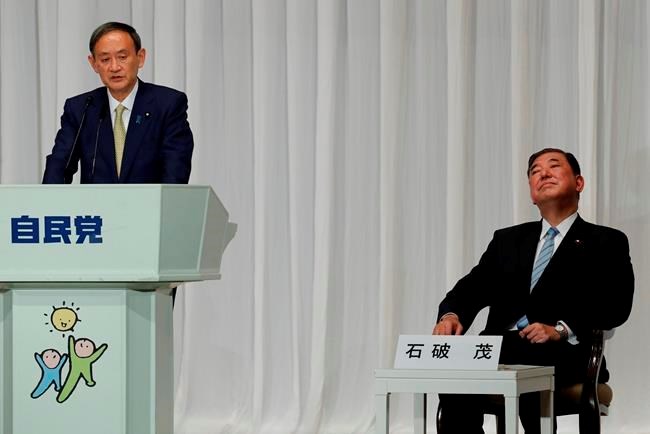TOKYO — The official campaigning to head Japan's ruling party began Tuesday, with outgoing Prime Minister Shinzo Abe's longtime right-hand man now seen as a front-runner to succeed him and complete his unfinished business, including coronavirus and economic measures.
Chief Cabinet Secretary Yoshihide Suga, 71, formally submitted his candidacy for the Liberal Democratic Party leadership Tuesday after announcing his intention to run last week. The top government spokesman faces two younger contenders, former
The winner of the in-party vote on Sept. 14 will eventually become Japan’s next prime minister because of the ruling bloc's parliamentary majority. Abe is stepping down for health reasons.
Suga is a latecomer
Suga pledged to carry out the challenges left behind by Abe, including measures on the coronavirus and the economic fallout.
“I will succeed Prime Minister Abe’s policies and push them forward,” Suga said at a candidates' speaking event. ”As we face the national crisis, we should never allow any political vacuum, and there is no time to waste."
He said coronavirus measures that would keep infections under control during the upcoming autumn and winter seasons, when another wave is feared, is the top priority. Suga said he hoped to secure coronavirus vaccines and treatment in the first half of 2021, a goal set by Abe in late August, while delivering economic measures to protect jobs, businesses and daily lives of the people hit by the pandemic “to regain a society where everyone feels safe.”
“We must prevent the explosive spread of coronavirus infections as in the U.S. and Europe, no matter what,” Suga said. “We will have to protect the people's lives and health, while also maintaining economic and social activity.”
The son of a farmer in the northern prefecture of Akita, Suga is a self-made politician, a rarity in Japan's largely hereditary business of politics and a particularly sharp contrast to Abe, the political blue-blood whose grandfather was also a prime minister.
Suga said he has never lost affection for rural communities like his hometown and
Suga also said Tuesday that he plans to establish a new digital agency to promote digital transformation, whose lack of progress has been criticized as a cause of slowing down coronavirus measures, in education, healthcare and other areas.
Suga also vowed to work on measures to promote women's advancement, including possibly allowing free fertility treatment for couples. Abe's “womenomics” policy aimed at empowering women failed to meet the 30% target of having women in leadership positions by 2020, when the ratio dwindled at less than 10%. There is no female candidate in the leadership race.
While Suga's policies and projects seem to be achieving practical goals, his vision in diplomacy and security, areas where he is seen as lacking experience, is unclear.
Suga on Tuesday said only that he would pursue the “free and open Indo-Pacific” policy of regional economic and security promoted by Abe and promote stable relations with China and other Asian
Ishiba, who has long been seen as Abe’s rival, is vying for the party leadership for the fourth time, calling for a change to the Abenomics economic measures to focus more support for small businesses and low-income earners as well as rural areas.
Ishiba called for a “great reset” of Japan by decentralizing Tokyo to revitalize local communities and other measures to rebuild the country. He also emphasized the need to rebuild Japan's democracy, which has become a mere majoritarianism, and to address the economic disparity that widened under Abe's administration.
Kishida, who is currently the party policy chief, says he seeks to be a leader who listens to the people’s voices more carefully than Abe and prioritize economic policies to address disparities. He had been seen as a promising successor to Abe, but his status plunged over fumbled coronavirus policies within the party.
___
This story corrects the spelling of Suga's first name to Yoshihide, not Yoshide.
___
Follow Mari Yamaguchi on Twitter at https://www.twitter.com/mariyamaguchi
Mari Yamaguchi, The Associated Press
